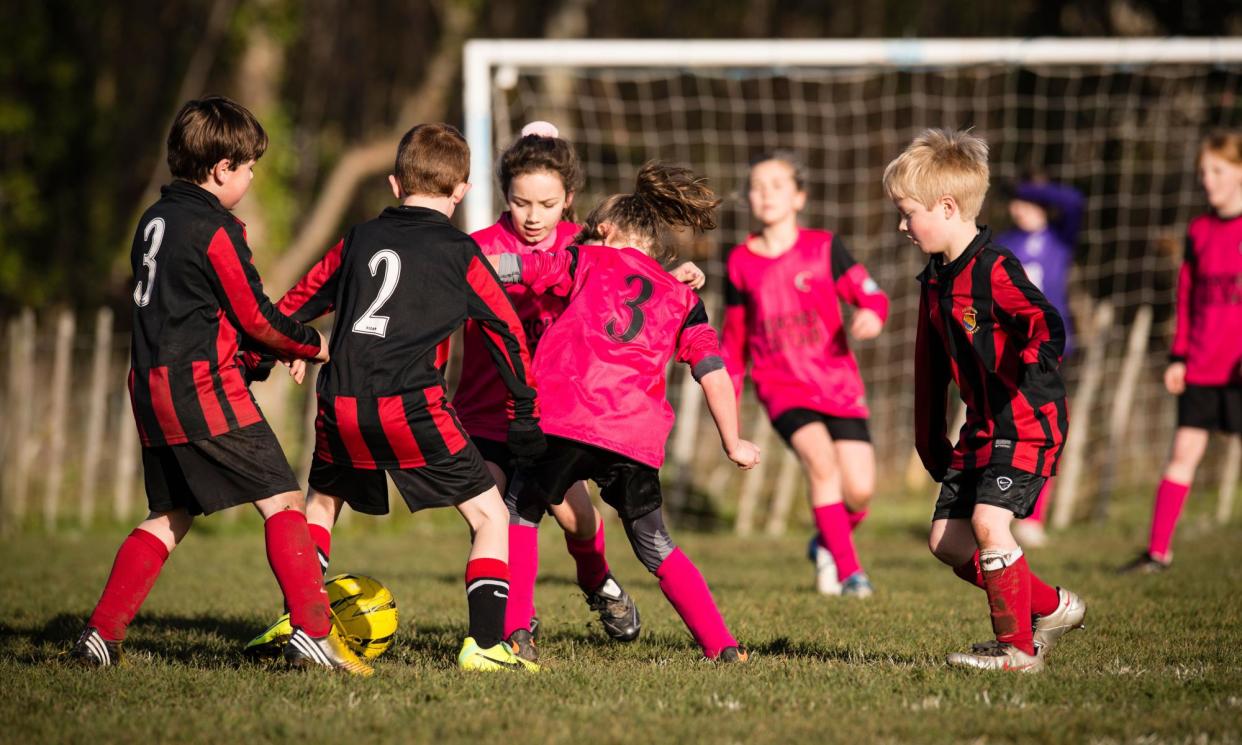Why are kids doing the ‘Brexit tackle’? They’re having fun at adults’ expense – and mocking our toxic politics

For the umpteenth time, my son, with an Ikea stuffed ball he has had since infancy, is playing football in the living room. He is joined by one of his best friends, an equally football-obsessed 10-year-old who, before slide-tackling in what can only be described as a deliberate attempt to knock my son’s legs off, shouts: “Brexit means Brexit!” Confused, I pass it off as an example of tweenage precocity: which 10-year-old is happy to quote Theresa May while playing football?
Over the next year, however, I will hear the term used again and again when my son plays football at the local park. He turns 11 and is off to secondary school. There, too, the phrase seems to have become a “thing”. One evening, as he recounts the details of how he got a painful-looking graze on his shin, he quotes the attacking player’s prelude to clattering into him: “Brexit means Brexit!” I ask, finally, why people are saying this. Nonchalantly, as he practises “skills” with the same softball, he explains that the Brexit tackle “is a tackle that doesn’t get the ball, only takes out the player”. Urban Dictionary concurs, stating it is, among other things, “when somebody hits a massive slide tackle and usually sends them flying and it hurts them servely [sic]”.
At first, I assumed this was a north London phenomenon until a quick Google proved otherwise. TikTok, now “the most favourable single source of news” for teenagers, was where my research flourished. In one TikTok post, football content creator Kalan Lisbie, with tongue firmly in cheek, walks viewers through “how to do the Brexit tackle”. He informs us that “the first thing you need to do is pretend like you’re going to boot the ball away and not tackle. Second thing is that you want to rotate those hips and as soon as you rotate, you want to take absolutely everything … and then just clean him”. A commenter on another video notes that school football is now more like WWE.
So where did the “Brexit tackle” come from? The phrase “Brexit means Brexit” became a joke right from its inception because it was so obviously meaningless – as even a Tory minister admitted at the time. In the face of great complexity, we were given what Fintan O’Toole called “ludicrous tautology”. That young people now repeat the political slogan during aggressive play should tell us that the phrase has become symbolic of a kind of empty-headed belligerence. If we keep in mind that the tackler is willing to hurt themselves – either by getting sent off the pitch or injuring themselves physically – then it can also be read as a pugnacious attempt to make things worse for yourself, just to make a point.
There’s a healthy dose of irreverence in there too – you have to admit, there’s something very funny about one child barking “Brexit means Brexit!” to another in a muddy park. You get the sense they’re having fun at older generations’ expense. Ask any parent of a tweenager or older: no one is better able to comprehensively make fun of, or call attention to, adult flaws and hypocrisy.
By adopting “Brexit means Brexit” and transforming it into a symbol of almost dangerously rough play, you get the sense that children are holding up a mirror to the adult world. They’re using it as a joke, to be sure, but it’s a timely reminder that politicians’ words and political stances extend far beyond the immediate context, seeping into the fabric of our children’s lives. Their playful satire draws on the overt aggression of our Punch and Judy politics, which started at Westminster and has now made it on to the school football pitch. Wouldn’t it be nice to have politicians whose shallowness and hypocrisy aren’t so easily mocked by 10-year-olds?
Lola Okolosie is an English teacher and writer

 Yahoo News
Yahoo News 
